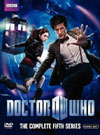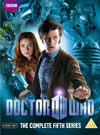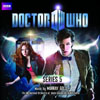DVD Extras (box sets only) include:
"The universe is tiny now.... Earth alone in the sky."Is that anything new? It seems to have been the case all season, and indeed in most of New Millennium Doctor Who. I think I'd have invested in the Pandorica mystery much more had it been located on a brand new alien planet we've never seen before. But no, it's Stonehenge. Yawn. At least 102 A.D. is a little bit cool. The season also seems to have an obsession with museums though. I don't mind that so much, but it is curious.When not pacing back and forth asking questions about what is going on in this adventure, the lead protagonists spend most of their time explaining the over-complicated plot to themselves. Lost in all this fuss is a clear sense of exactly what they're struggling against, if not their own imagination. Every now and then they attempt to use "time being rewritten" as an explanation for what occurs. But nowhere (nowhen?) do we get any indication that this is due to somebody at somepoint making a decision differently to what history remembers. Instead we've got hyper-advanced technology like the TARDIS or the Pandorica doing something inexplicable, which just happens to erase everything, or bring everything back, always of course leaving just enough wiggle room to let our protagonists run around trying to do something with one half-dead villain or another from the show's past dragging itself after them to add a bit of tension. Every now and then comes a sequence that crams a bit of everything into too short a space to do any of it justice. The opening is a bit of a gratuitous re-run of characters from this season's previous stories, plus a quick flip-through of a couple of off-planet settings that we should have had more of. Leave off the guest star re-runs. Give the planets to us in their own proper stories. Then there's the questionable act of trying to cram in every major alien adversary the show's ever had into one big simultaneous cameo. If anyone was looking forward to seeing any particular one, they're probably disappointed. They came as a (relative) surprise to me on first viewing, but it was hard to be excited about it, since I couldn't anticipate the lot of them having much of anything to do. They basically all share one role - and it's not really a very big one.
If the Alliance is about getting back at the Doctor, which is frankly far more believable motivation for the "big" villains gathered here, we now have another problem. A good deal of the more "minor" aliens don't seem to deserve to be part of this alliance, since they aren't really of the villainous variety. Why would Judoon and Silurians turn against the Doctor - they've no long-term grudges against him. Or non-criminal Terileptils? Or Draconians? If they've got it in for him, why aren't some future humans in on this Alliance as well? If there's one alien who's really at home here in this plot, I'd say it was Christopher Ryan's Sontaran. He does at least get a couple of the best lines, and gives the most memorable acting job during this overpopulated cameo scene.
Time or Memory?So, the minute the Doctor is sealed within the Pandorica, the alien alliance crumbles and the universe disappears. Did the alliance inadvertently create the very thing they feared? Did they mistakenly blame the TARDIS exploding for the disappearance of the universe(s)? Has the universe actually collapsed because somehow the Doctor is "now" prevented from doing something in some future adventure to save it? This seems to be the most plausible explanation the audience can guess at with nothing else being offered, particularly since the whole TARDIS exploding thing remains a point of confusion and speculation. But even then, how can we buy it, since, in order to continue to make a concluding episode that still features the show's star front and center, the Doctor is very quickly and easily let back out of the Pandorica without much of a challenge? Once more, the audience is left at a loss to know exactly what any of these characters are struggling against, other than their own confusion.As far as manipulating time goes, Moffat seems to pull off his best stuff when simply letting the audience discover cause and effect in the wrong order, as with the Doctor's jumping around with River's vortex manipulator on his wrist, none of which explores alternate versions of events. These are the bits that are understandable and watertight. But where it comes to the big changes and the threats of the universe disappearing, this ultimately makes less sense as manipulation of time, and more sense as manipulation of memory - an area where there is perhaps more room for artistic freedom. Most of Moffat's scenes concerning memory are really poignant and moving, and this is where the finale's conflict gels best. But whether this is a time problem or a memory problem, there is pretty much equal danger of this turning into "The Adventure That Never Really Happened", which most audiences find disappointing most of the time. I think that danger is magnified here, as it easily seems to want to encompass the entire 31st season as well, and if it does that, how can it not also encompass the rest of River Song's future and past experiences with the Doctor, or even the previous 30 seasons of the show? Indeed the season and the finale's bizarre events need make no more sense than a star that burns cold, if we want to say the Dream Lord made it all up and one day our protagonists wake up and sort out which memories were real and which were only dreams. But who wants a finale that didn't really happen? The memory issue is interesting enough that I could handle it focused in a single 90-minute (or 103-minute) adventure, even if that adventure turned out never to have really happened. I'd be very reluctant to accept an entire season of Doctor Who getting "time-rewritten", or turning out to be a figment of someone's imagination or aberration of memory. Applying that across 31 years of the show's history is out of the question. Not going there. In the end, this adventure's presentation of the memory issue leans a little too much towards fairy-tale for my tastes, largely because it doesn't contain the fairy-tale within its own 100-minute single-adventure boundary, and lets it spill out over only-Moffat-knows-exactly-how-much of the rest of the show. Indeed, with all the redo's that seem to happen, I find myself at the end of the adventure not feeling like I know what really happened, or what was simply imagined, and it tends to lessen my investment in the characters. It's all a bit too Peter Pan in the end - some of us actually came to get some decent sci-fi, and fairy tale doesn't quite cut it. Mind you, I'm incredibly curious to see more, but less willing to invest in the reality of the challenges that face these people, since I'm less and less convinced that those challenges make any real sense. Interestingly, Star Trek: The Next Generation seems to have tackled similar problems of disappearing people, memory losses, and collapsing universes in its fourth season episode "Remember Me", and pulled it off with an equal sense of mystery, plus far greater finesse, audience emotional investment, and understandable and believable payoff. Just a regular episode they came up with off-the-cuff that beats this over-planned season finale hands down. Compare the two for yourself, and see what you think.
Format-Locked for Domestication? Who would ever have thought....?Another area of dissatisfaction with this story for me was the whole element of resurrecting Rory and the impending wedding, and setting the final beats of the story at the wedding. It feels less like we're resolving the issues of the season, and more like we're bringing the fifth-wheel problem back into the Doctor's relationship with his companion. Really, it's hard to get any worse with that idea than to have a companion bring a spouse along into the TARDIS on their wedding night, and then have their journey be about answering a phone call for some Earth-bound-sounding Christmas-special nonsense. At times like that, I really wonder if there's anything left of the show I used to love about a timeless galactic wanderer.At least the wedding is allowed to be a wedding, with no idiot exploding Christmas ornaments or unexplained robots wandering around. Sometimes normal events are more powerful without the bizarre. And when all is said and done, I think the Doctor gets satisfying actions to perform to solve the challenges of this story, with a decent hand over to Amy to finish up one of the last ones, which may be the most thematically important of course. Not bad. I'd have preferred a different setting other than the wedding, either through time-rewriting or just picking a different point in Amy's life to begin with, but still, not bad.
Production
I'd rate this adventure easily better than either "Bad Wolf" (the season 27 finale) or "The Sound of Drums" (the season 29 finale). It's on about the same level as "The End of Time" (story no. 207), having about an equal number of unbelievable things in it, while giving about as good an emotional ride with a stronger sense of mystery, even if it requires more many more words to think through and explain my nits in this case.
International Titles:Deutsch: "Die Pandorica"
Magyar: "A Pandorica"
Français: "La Pandorica s'ouvre"
Русский: "Пандорика открывается"
Italiano: "La Pandorica si apre"
Season 31 Rankings:
This story has become available on DVD and Blu-ray. Click on the Amazon symbol for the location nearest you for pricing and availability:
Note: The full season sets contain commentaries, behind-the-scenes featurettes, and other extras. The smaller volumes only feature the plain episodes. Comments on this article are welcome. You may contact the author from this page:
|
|||||||||||||||||||||||||||||||||||||||||||













